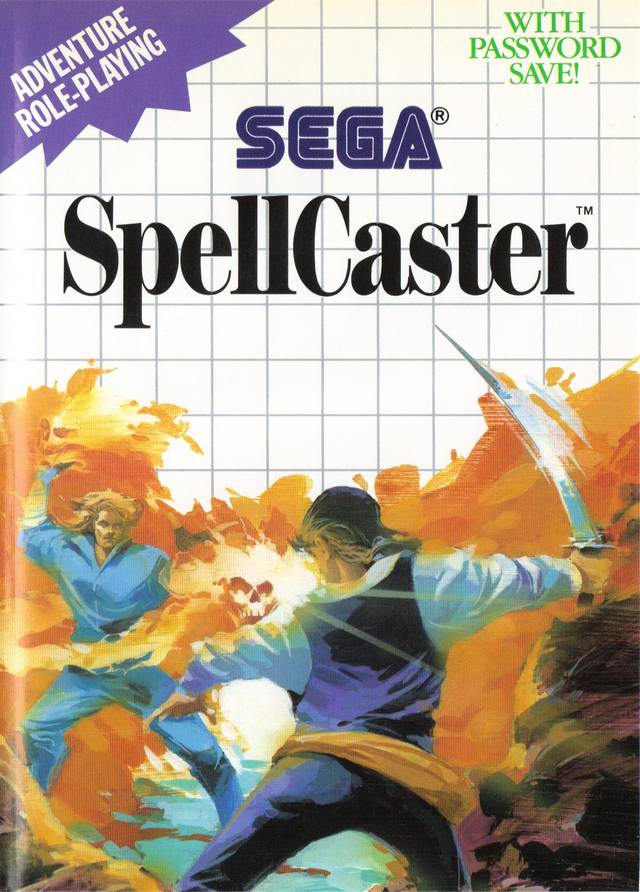
PLAYERS: 1
PUBLISHER/DEVELOPER: Sega
GENRE: Action/adventure
RELEASE DATE: 09/23/88 – (JP), 09/89 – (US), 1989 – (EU)
Futuristic samurai warriors, ancient Japanese landscapes, resurrected serpent gods, and an extravagant amount of spell casting all can be found in SpellCaster. You play as Kane, a warrior of the mystical arts, and your master Daikak has commissioned you to check on the whereabouts of other mystical warriors. The story gets hazy and nonsensical from the get-go, which might seem like a detriment considering how much the game wants you to care about the plot. Roll with the “shocking” plot twists and babble between non-playable characters, and you’ll find plenty to appreciate here.
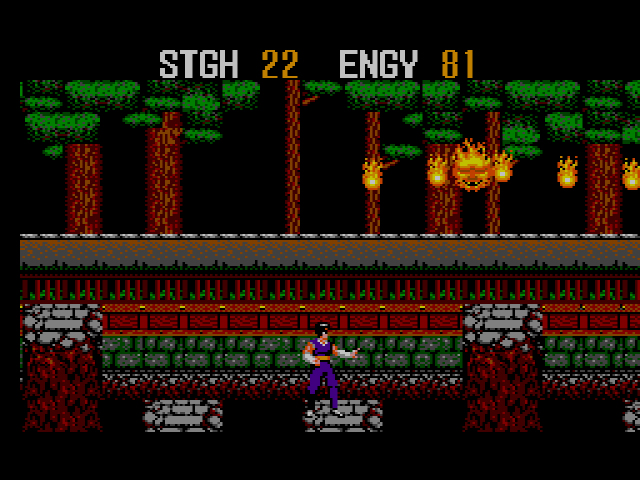
SpellCaster‘s strength lies in its perusal of different genres. The game starts off as a side-scroller, like Kenseiden or Shinobi. Enemies fly at you in clusters, you shoot them with your blue fiery magic chunks, they explode, and the cycle begins anew. Once you head into a temple or a town, the game turns into an adventure. You’re expected to LOOK at strange items, TAKE swords, use SPELLS to break down barriers, TALK to cybernetic samurais, and MOVE to your next location. There are minor RPG elements, as well. Kane has nine different spells he can use from the beginning of the game, most of which are useful for one scenario or another. For example, Makiri allows you to fly for about thirty seconds. Given SpellCaster‘s abundant one-hit death pits and chasms, Makiri is a spell you’ll often use in the side-scrolling portions. You also have Strength and Energy, as indicated by the numbers at the top of the screen. Strength is your life, Energy is for spells. These can be upgraded a few times by getting items, but you never manually use or equip any item you find; ditto for upgraded armor and weapons.
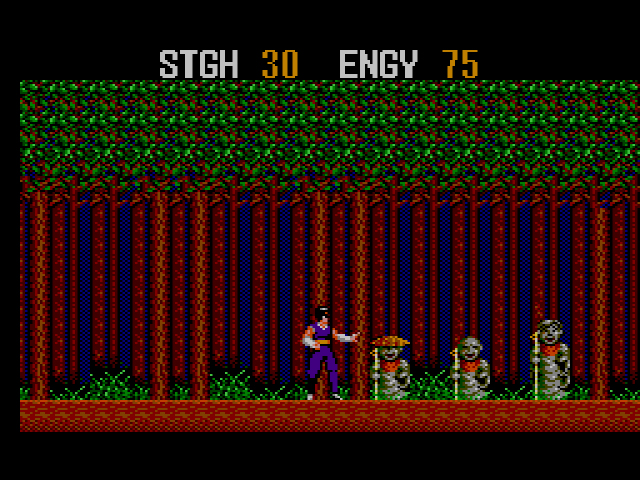
Because SpellCaster never commits to one genre, the game isn’t very deep. Side-scrolling portions are quite easy, particularly when you’re shooting out one-hit kill energy balls and you’re flying over the level with Makiri (which I did – a lot). Because SpellCaster isn’t a mystery, per say, the adventure portions never require puzzle solving or in-depth sleuthing. Usually, the screen will show one person or one item and you’ll have to TALK/LOOK at said person or item to progress the story, but that’s all. That’s not to say SpellCaster doesn’t take spooky turns into Difficultville. Wait until you’re trying to cross the ocean around the game’s halfway mark. Not only do you not have a map, but most of the ocean screens look exactly the same so it’s easy to get lost.
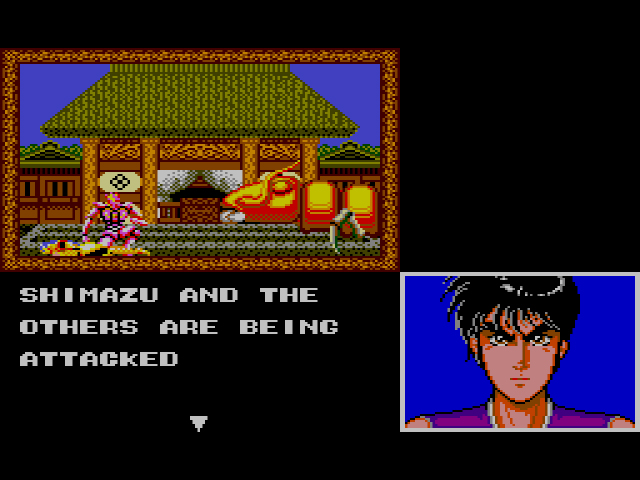
SpellCaster wasn’t born from some crazy Sega employee’s head. The game is actually based on the manga “Kujaku O” or “Peacock King.” In the manga, “Kane” is Kujaku, a Buddhist monk who hunts and exorcises demons. According to the Wikipedia page, he is the reincarnation of Mahamayuri, one of the Buddhist Wisdom Kings; Lucifer a.k.a. Satan from Christianity; and Melek Taus, or “Peacock Angel” in the Yadzi religion. Kujaku also likes porn and seafood because, lest we forget, he’s a main character in a manga. Needless to say, none of these controversial aspects of the manga made their way into SpellCaster‘s story. I don’t blame Sega in the slightest. Playing as a Buddhist monk who is 1/3 the reincarnation of Satan would be a little tough to stomach for American audiences, even today.
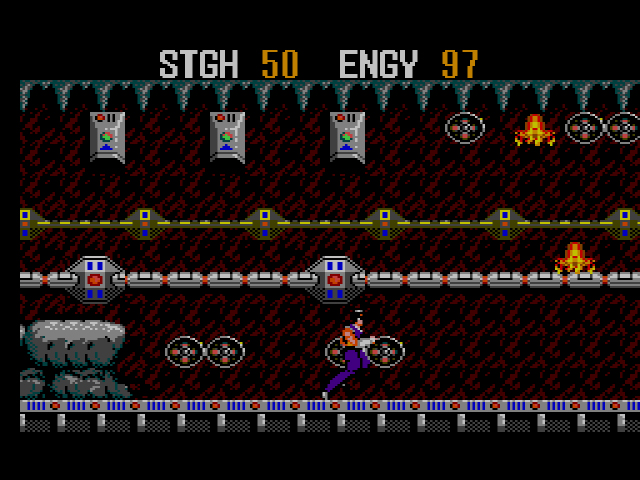
I’ve reviewed a ton of games over the years, most of them 8-bit. Due to their simplistic natures, my opinions of them usually fall between one of two options: a) this game is an atrocious waste of time or b) hey, that was great, how about I play some more. Then there’s SpellCaster, which is… enjoyable enough? The side-scrolling was tight, if not a bit short. The adventure/story was cheesy and filled with spelling errors. The light RPG elements were nice, even if I had no control over them. And yet, despite the game’s window dressing, SpellCaster as a whole is shallow. The game exists not to immerse you in itself, but to tell its weird pointless story. Just when you’re starting to enjoy a portion, it’s over and you’re on to the next plot point. Then again, take any one genre out – side-scrolling action, adventure, or RPG – and who knows whether SpellCaster would hold mine or anyone else’s interest. I’m conflicted, you see. Which is why I recommend every Master System fan play SpellCaster, if only because I’m unsure of its appeal.
B


11 replies on “SpellCaster (Master System, 1988)”
I think your review was mostly spot on. I recently played it for the first time and finished the game, but not without a lot of headaches.
First of all, the password save system is atrocious, with a tedious combination of upper and lower case letters, and numbers.
The pyramid level is very difficult and you will not get far without a map. There are certain doors you must go through to gain access to different levels, and you must be able to go up stairs without an enemy hitting you or you get knocked off and must try again.
Hitting the pause button on the console everytime to bring up the spell select screen is a hassle. Why, Sega, could you not put a pause button on the controller? There were many times when I had a spell equipped and accidently fired it off by pressing down and button 1 by accident when I was trying to duck under an enemy. The only solution to this would be to immediately unequip a spell once you use it, again by the hassle of reaching for the pause button.
The last action stage was truly the best, with you flying overhead while attacking numerous bosses.
I’ll be honest, I only made it about 2/3 of the way through the game. I can’t imagine playing this on the original console and being forced to use a save system. I should take that into account for future password save games.
And yes, I agree, why couldn’t Sega have included a pause button? It’s just common sense!
“Why, Sega, could you not put a pause button on the controller?”
I haven’t tried this myself – since I like to keep the SMS experiences as authentic as possible – but if you’re playing on the original hardware, you could always plug in a Mega Drive controller which has a Start button. Obviously that option wasn’t available in 1988. Since We’re all older now and our backaches don’t allow us anymore to spend hours on our knees, bend over a silly console, I guess we have an excuse 😉 I myself still operate the pause button with my right foot!
On auction websites, flea markets, … I often see the console being sold with upgraded Atari 2600 controllers. Imagine playing a platformer with those …
I used to play Space Harrier with my Atari 2600 joysticks. Not the original ones but on of the larger flight stick type deluxe models.
FYI – If you plug a genesis controller into the master system, the controllers start pause button does not function. The master system hardware does not have a pin assigned to the start button. So on original hardware, the only way to pause is using the button on the console. Same is true if you’re using a power base converter.
One thing I have learned from this site is just how many SMS games had Japanese manga/anime backgrounds.
I didn’t have this game as a kid, and only finally picked it up a few years ago. It reminds me of Black Belt, Kenseiden, and Lord of the Sword all bundled up into one game that’s better than any of those others. I regret not owning this one as a kid.
SpellCaster would have been a great game to play as a kid. And you’re right, it’s better than all the ones you mentioned. Considerably better.
I actually really liked (and still do like) Black Belt, Kenseiden, and Lord of the Sword (gasp!). Well, I like them more than you do. But we’re in complete agreement on Spellcaster.
On a side note, I’m so glad to see the podcast back up and running again. It’s my favorite. I’ve been playing along at home to as many titles as I can (original hardware only). Thanks for all your hard work. I need to get on that Patreon.
Thanks for the kind words. Yeah, I’m as glad as anyone that the podcast is back. And I love that you’re playing along!
I have fond memories of playing Spellcaster back in 1989 – sure, the story made no sense, and the gameplay was repetitive at times, but when you consider what the options were at the time (unless you were rich enough to have a computer) it was an amazing game. Finishing the game gave me such a sense of accomplishment – never once did I have to call Sega’s free hotline.
I didn’t know it was based on a manga, I’lll have to go check that out.